In pictures
Queer campaigning in government records
While campaigning for change, various LGBTQ+ groups have interacted with government. Although activist archives hold most of the archive material, these groups have also left traces in ours.
These records track challenges to legislation tending to relate to gay and bisexual men or gender identity.
Important information
This gallery covers themes relating to homophobia, biphobia and transphobia. Original language is used here to accurately represent our records and help us fully understand the past.
Memorial by the Homosexual Law Reform Society
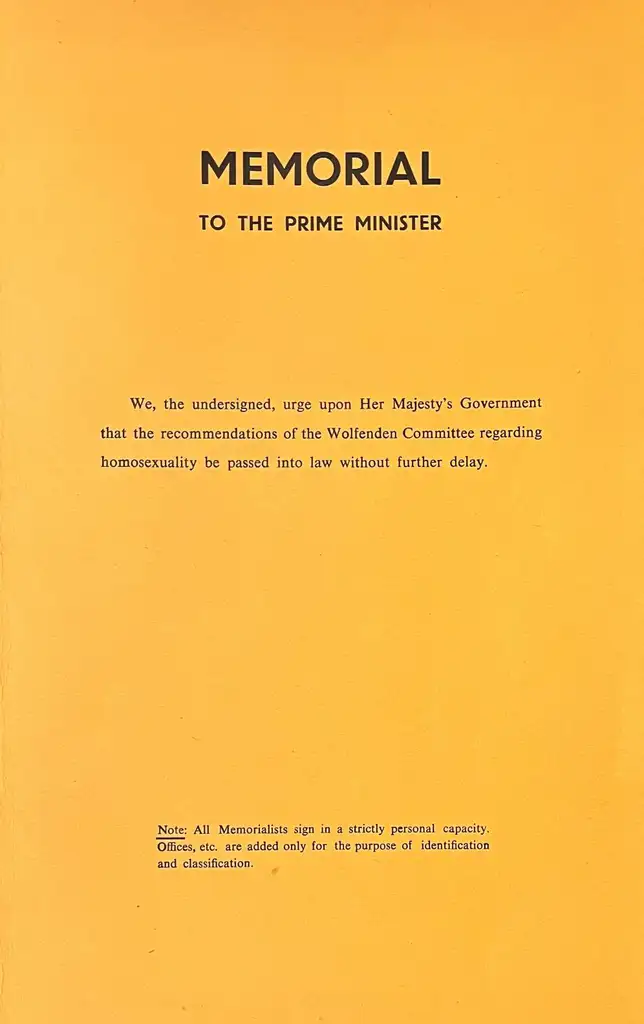
- Date
- 1965
- Catalogue reference
- HO 291/127
The Homosexual Law Reform Society (HLRS) was founded in 1958 in support of the 1957 Wolfenden Report. The report recommended the partial decriminalisation of homosexual acts between men in private. HLRS was a rare group campaigning on gay issues at a time when homosexual behaviour was a crime.
In 1966, led by Secretary Anthony Grey, HLRS requested to meet with the Prime Minister to present a petition calling for the early passage of the recommendations into law. Signed by many notable individuals, they ended up meeting with Home Secretary Roy Jenkins. They argued the existing law was fundamentally unjust, did not act as a deterrent, and drove people underground.
Despite the petition and meeting, it took over a year for the law to be changed in England and Wales under the Sexual Offences Act 1967, which permitted homosexual acts between two consenting adults in private over the age of 21.
Pamphlet by the Campaign for Homosexual Equality
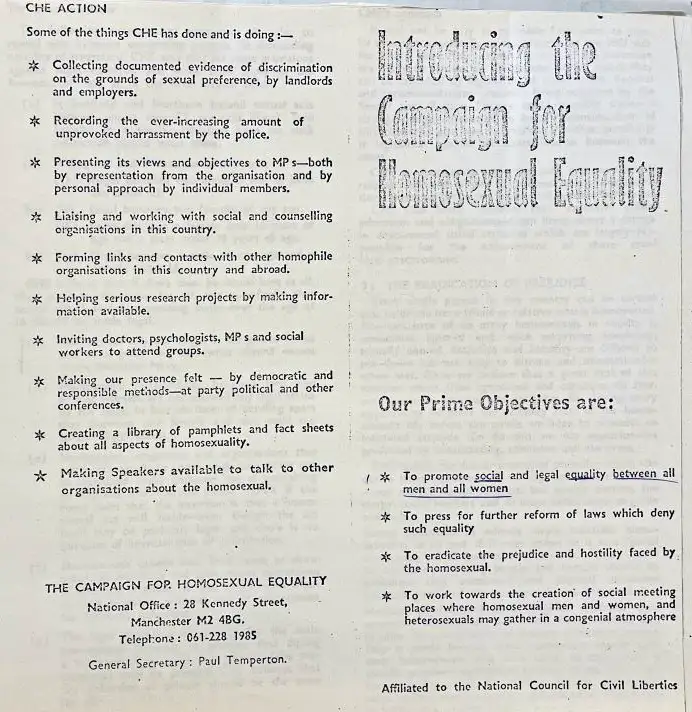
- Date
- 1972
- Catalogue reference
- AIR 2/18125/1
The Campaign for Homosexual Equality (CHE) was founded in 1964 by Allan Horsfall and others from the North Western Committee for Homosexual Law Reform. There were local CHE branches across the country.
A letter from the Liverpool branch of CHE requested their local MP look into the limitations of the Sexual Offences Act 1967. This included the unequal age of consent, military and Merchant Navy exemptions (where homosexual acts remained illegal), and the exclusion of Scotland and Northern Ireland. Included with the letter was this photocopied leaflet 'Introducing the Campaign for Homosexual Equality', which outlined their prime objectives of law reform, eradication of prejudice, and social facilities. Prioritising social and legal equality, their aims were broader than the HLRS.
Labour Campaign for Gay Rights submission to the Royal Commission on Criminal Procedure
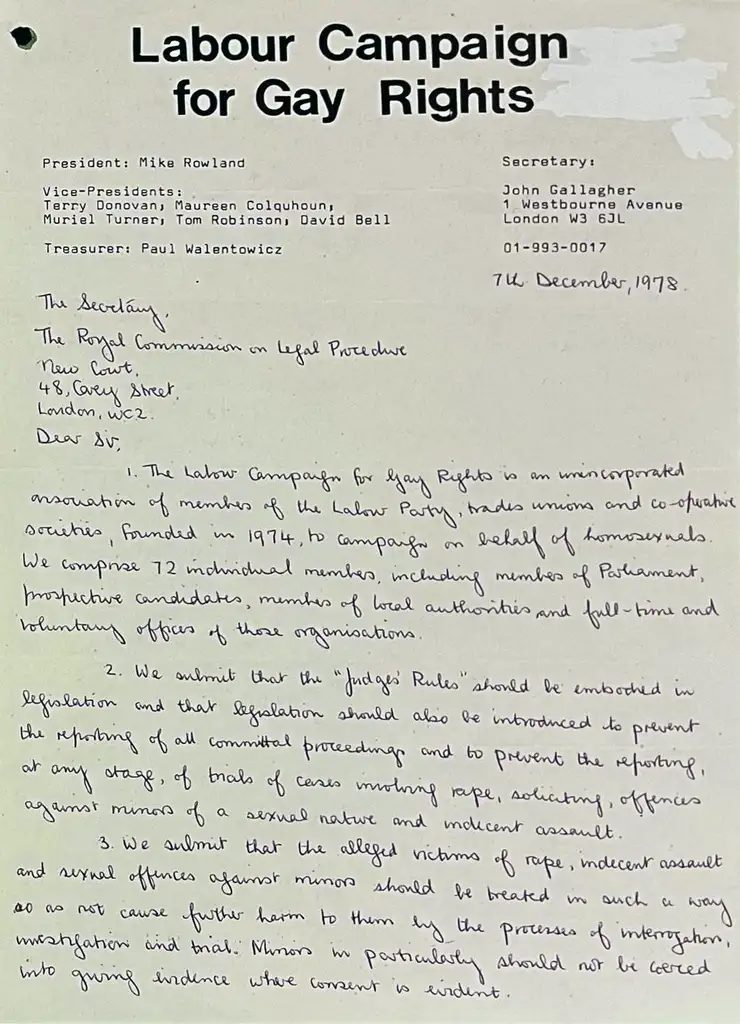
- Date
- 1978
- Catalogue reference
- BS 12/243
Political parties were increasingly developing their own pro-equality arms. 1975 saw the creation of the Gay Labour Caucus and the Conservative Group for Homosexual Equality (later called TORCHE). By 1978 the Labour group became the Labour Campaign for Gay Rights, and its members included Labour MPs and trade unionists.
The Royal Commission on Criminal Procedure also started in 1978. Established following reports of potential miscarriages of justice, its remit included examining police powers, the rights of the accused, and the procedure for criminal prosecution.
It was a significant opportunity for gay and bisexual men's voices to be heard on the continued policing of their lives, arrests had increased after 1967. Various LGBTQ+ groups wrote in to share their perspectives, including the Labour Campaign for Gay Rights, who argued for more protection for gay men accused of consenting acts.
Letter from Jeffrey Dudgeon and the Northern Ireland Gay Rights Association
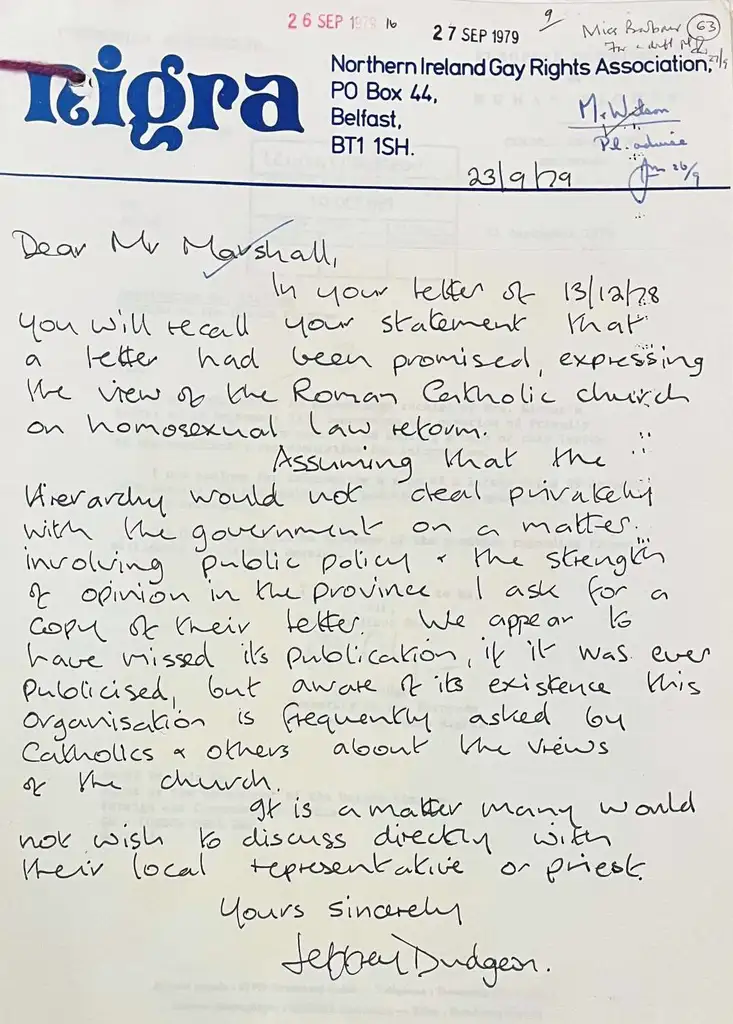
- Date
- 1979
- Catalogue reference
- [unknown]
The Sexual Offences Act 1967 only applied to England and Wales. The Northern Ireland Gay Rights Association (NIGRA) led the agitation for reform, described in government records as 'the most militant and politically naive of the homosexual organisations'.
Jeffrey Dudgeon, NIGRA secretary, was one of over 20 people questioned about possible criminal activity, with evidence of homosexual activities obtained from his letters. It was decided not to prosecute. In 1975, he submitted a complaint to the European Commission of Human Rights to challenge these unjust laws.
The 1981 judgment of the European Court of Human Rights in Dudgeon v United Kingdom found a breach of Dudgeon’s Article 8 right to a private life. The ruling led to the Homosexual Offences (Northern Ireland) Order 1982, partially decriminalising homosexual acts, and has been referenced in challenges to homophobic laws worldwide.
Letter from Ian McKellen to Prime Minister John Major
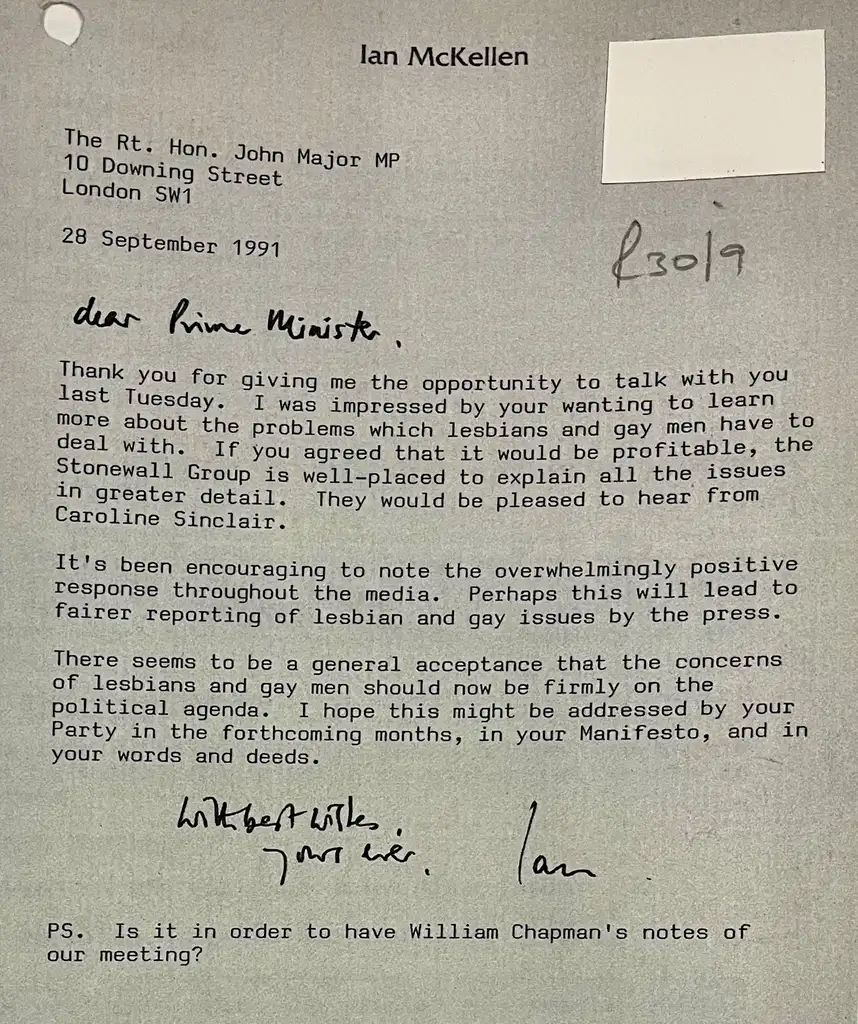
- Date
- 1991
- Catalogue reference
- PREM 19/4734/1
Sir Ian McKellen is an English actor and campaigner. He came out as gay on live radio, in 1988, while objecting to the introduction of Section 28. He has since championed LGBTQ+ movements.
McKellen was one of the founders of Stonewall, created in 1989 and inspired in name by the Stonewall Riots. They used more traditional political lobbying methods, leading to more surviving items in government collections.
In 1991, he met with Prime Minister John Major as a representative of Stonewall to discuss gay rights. Major wanted to listen to the actor's concerns, such as the unequal age of consent and criminal law. This letter details his appreciation of the meeting and asks Major to continue addressing these issues, 'in your Manifesto, and in your words and deeds.'
Their meeting gave impetus for change. Within a few years Parliament had voted to lower the age of consent for sex between men to 18.
Peter Tatchell article on over policing in Capital Gay
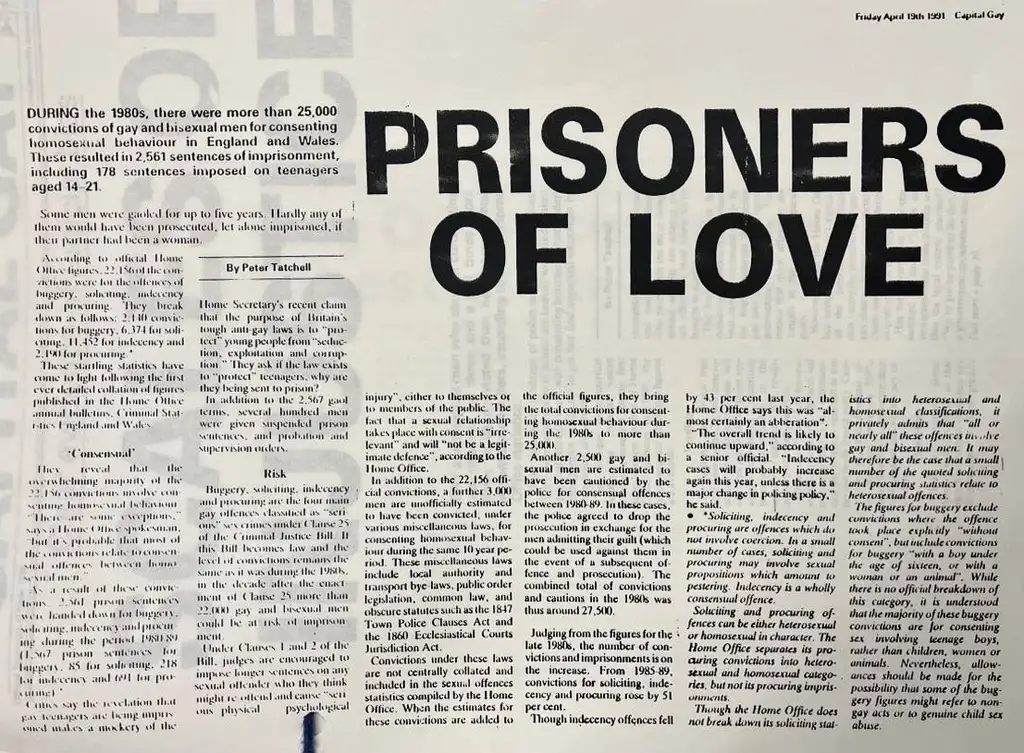
- Date
- 1991
- Catalogue reference
- HO 528/54
Despite legal change, issues around policing in the gay community persisted. Over policing, police entrapment and homophobic attacks continued.
A national survey on policing practice was to be completed by chief constables, which was hoped would inform Home Office policy. Many groups wrote in to put pressure on the government including Stonewall, the Leicester Lesbian and Gay Action Group, and the Gay London Police Monitoring Group (GALOP).
Material sent to the government included a copy of the first Stonewall newsletter, dated 1990. Written by Michael Cashman and Lisa Power, it details the group's aims. Peter Tatchell, campaigner and founding member of OutRage!, also wrote to the government enclosing a copy of his article from the gay press, which 'point[ed] very strongly towards anti-gay bias within the criminal justice system.'
Terrence Higgins Trust HIV awareness poster
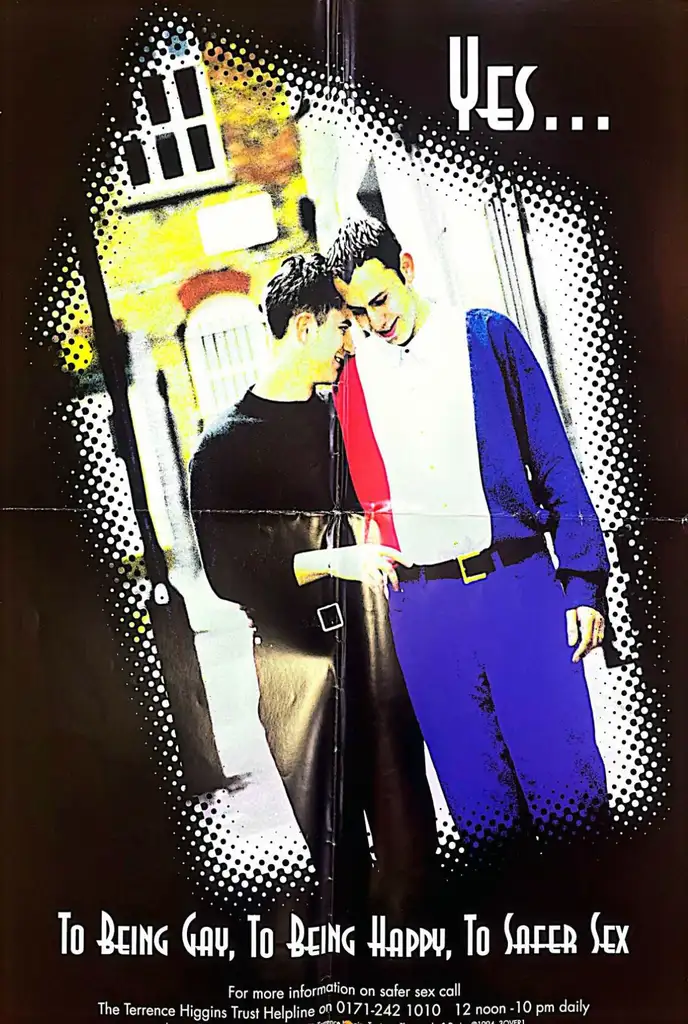
- Date
- 1995
- Catalogue reference
- JA 235/381/2
The first death from an AIDS-related illness in the UK was in 1981. The HIV epidemic had a huge impact on the gay community, with many seeing friends and partners die. By 1994, the age of consent had changed from 21 to 18, and HIV related health campaigns were finally able to be targeted at a younger audience.
The Terrence Higgins Trust, the first charity in the UK to be set up in response to the epidemic, created a series of awareness campaigns aimed at young gay men. The government tried to keep informed about the various HIV campaigns, and three Terrence Higgins Trust posters were preserved. They are a stark contrast to the hard-hitting adverts of earlier government campaigns. The posters depict encouraging, happy images of gay or bisexual men, with more positive slogans, such as 'Gay by nature, happy by choice'. They were designed to counter the shame, stigma and secrecy around HIV.
Gay London Police Monitoring Group leaflet highlighting lesbian hate crimes and support
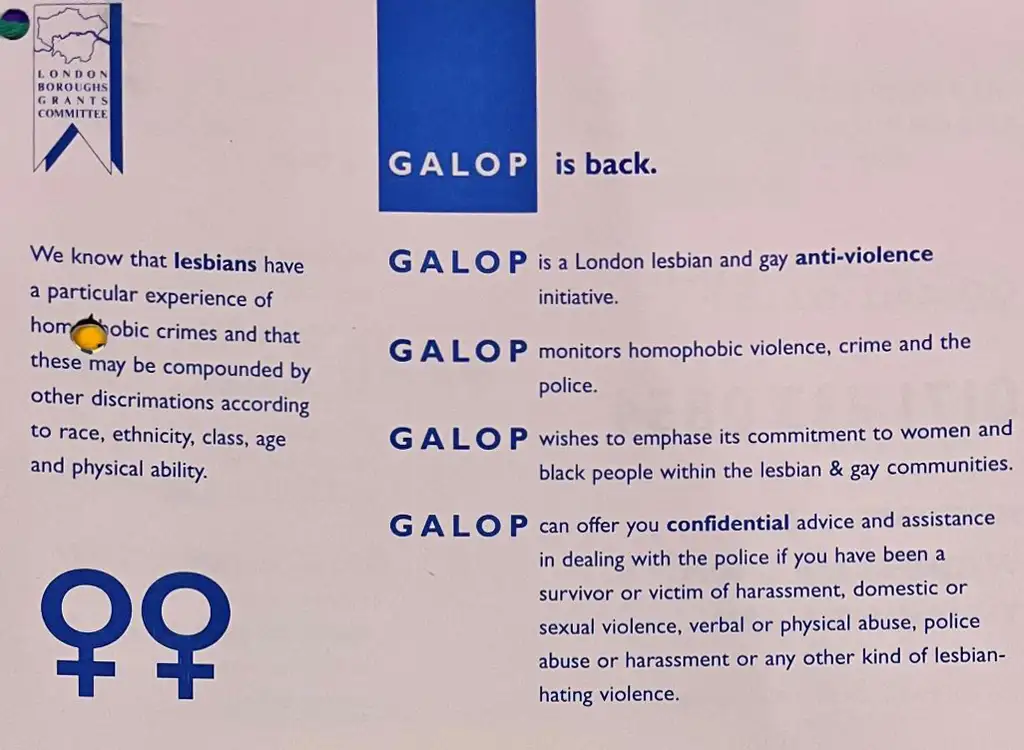
- Date
- 1994–1996
- Catalogue reference
- HO 500/165
This item is from a file that shows a shift in tone. The Home Office was discussing the creation of a national steering group on lesbian and gay policing issues. The government was actively collecting material to better understand the issues affecting LGBTQ+ people.
The material reflects everyday police issues faced by the community, such as a leaflet from Stonewall on 'queer-bashing' (unprovoked homophobic attacks), and this lesbian focused GALOP leaflet that acknowledged lesbian specific experiences of hate crimes. The literature recognised this could be compounded by other factors such as age, race, class and physical ability.
In this file are records relating to trans rights, including a copy of a Radical Deviance (self-described 'journal of transgendered politics') and a planned mass application to change the legal gender on birth certificates from trans organisation Press for Change.
Polari Housing report 'As we grow older'
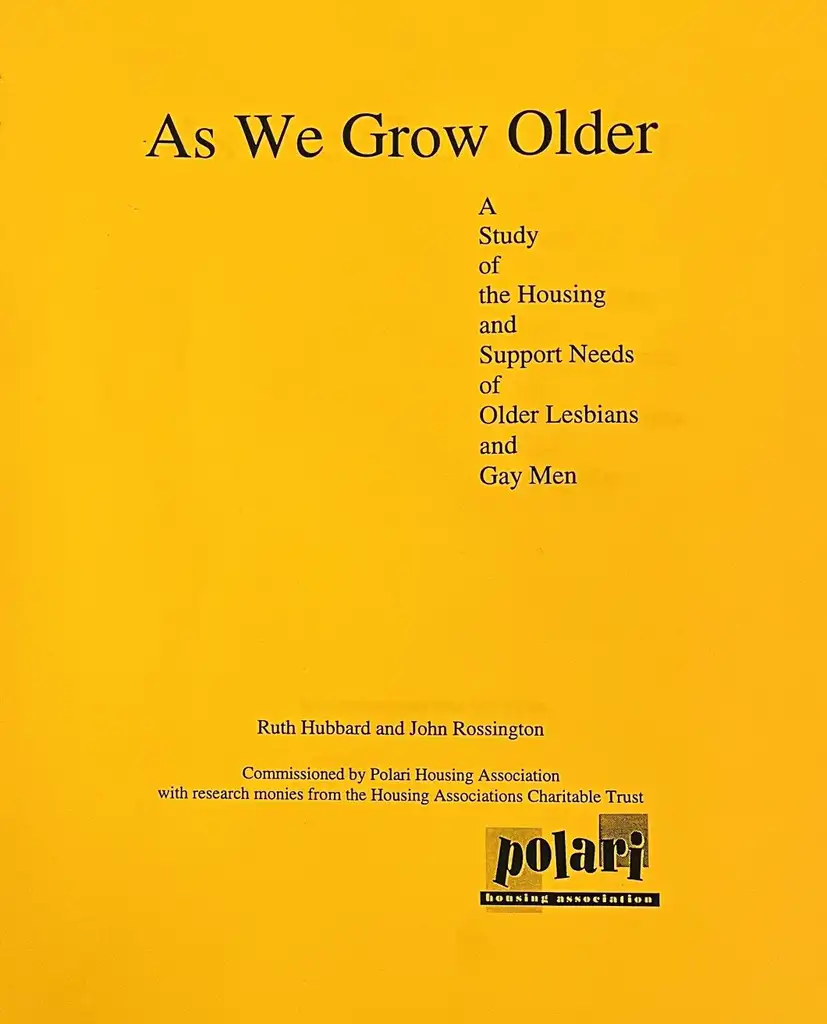
- Date
- 1998
- Catalogue reference
- JA 1/44
Towards the end of the 90s, groups were increasingly forming around issues affecting older lesbians and gay people, such as housing and social care provision.
When the Royal Commission on Long Term Care for the Elderly was appointed in December 1997, several groups representing the interests of older LGBTQ+ people, including Stonewall Housing, submitted oral and written evidence.
The Gay and Lesbian Humanist Association submitted this report by Polari Housing on the needs of older lesbians and gay men. Of the 131 people surveyed in the report, 91% of women and 75% of men wanted to see the development of specific accommodation for lesbians and gay men.
These records show a shift from dominant concerns around legal reform to the need for safe, supportive spaces at all points of life, and care for those who had lived through homophobic laws and discrimination.
Report from the 'Interdepartmental Working Group on Transexual Issues'
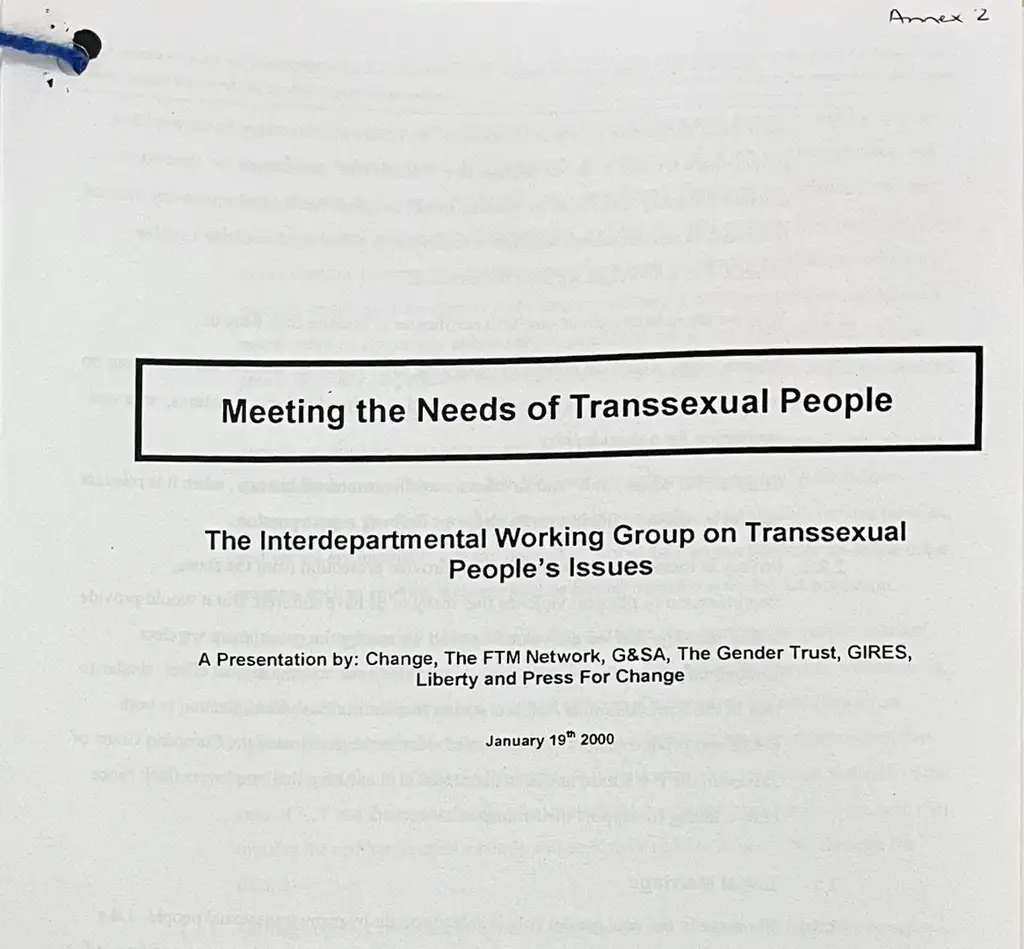
- Date
- 2000
- Catalogue reference
- PREM 49/2015
In 1999, as part of their pro-equalities agenda, the Labour administration set up an ‘Interdepartmental Working Group on Transexual Issues’. In early 2000, key activists and charities were invited to present their views to the government working group, including The Gender Trust, GIRES, Liberty and Press For Change. The final document was entitled ‘Meeting the Needs of Transexual People’.
The submission argued that these groups had collectively 'already done much of your work for you' but needed more government support. Two key issues raised were gender recognition on birth certificates and the validity of marriages post transition. Collectively, the government working group and the submission by campaigners fed into the passing of the Gender Recognition Act 2004.
The government, campaigners, and charities were working together to make change.
Featured article
Focus on
Section 28: impact, fightback and repeal
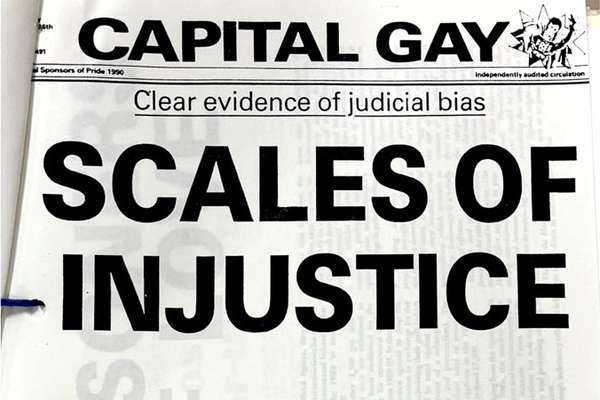
What was the everyday reality for LGBTQ+ people in the 80s and 90s living under the infamous Section 28, and how was it eventually repealed?